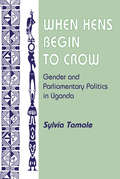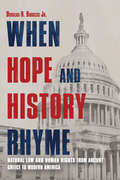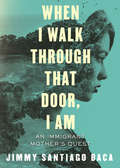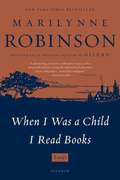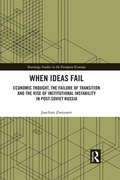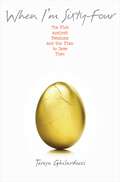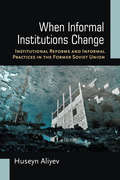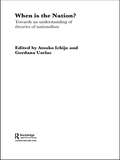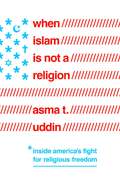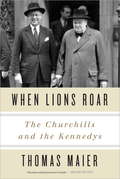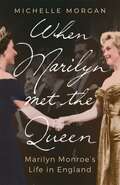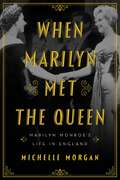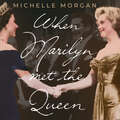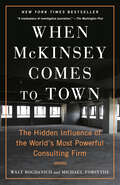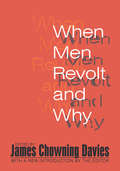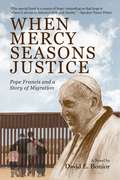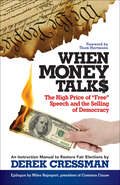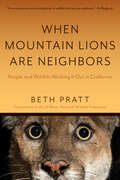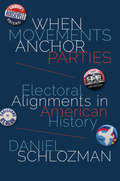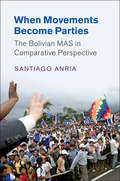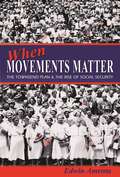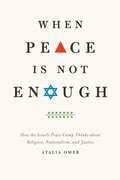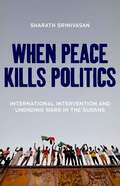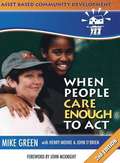- Table View
- List View
When Hens Begin To Crow: Gender And Parliamentary Politics In Uganda
by Sylvia TamaleAmong African countries, Uganda is unique in its affirmative action program for women. In the late 1980s, President Yoweri Museveni announced his belief that Uganda's successful development depended on increased gender equity and backed his opinions by setting several women-centered policies in motion, including a 1989 rule that at least 39 seats in the Ugandan parliament be reserved for women.In this fascinating study, based on in-depth interviews with both male and female parliamentarians, women in nongovernmental organizations, and rural residents of Uganda, Sylvia Tamale explores how women's participation in Ugandan politics has unfolded and what the impact has been for gender equity. The book examines how women have adapted their legislative strategies for empowerment in light of Uganda's patriarchal history and social structure. The author also looks at the consequences and implications of women's parliamentary participation as a result of affirmative action handed down by the president, rather than pushed up from a grassroots movement.Although focusing on Uganda, Tamale's study is relevant to other African and non-African countries grappling with the twin challenges of democracy and development.
When Hope and History Rhyme: Natural Law and Human Rights from Ancient Greece to Modern America
by Douglas BurgessAn exploration of natural law for an era of deep division: Burgess lays out the long struggle to protect human rights for all citizens.Dr. King's famous words—"The arc of the moral universe is long, but it bends towards justice&”—rest on the thinking and policy of philosophers and legislators from ancient Greece to the present day. Douglas R. Burgess Jr.—a broadly published writer and professor of legal history—tells us that important story, from the Greeks to the Middle Ages to the Enlightenment, ending with FDR's "Four Freedoms" and the Nuremberg Trials. With timely reference to recent assaults on human rights, including the 2021 attack on the US Capitol, When Hope and History Rhyme has both historical sweep and contemporary significance.
When I Walk Through That Door, I Am: An Immigrant Mother's Quest
by Jimmy Santiago BacaPoet-activist Jimmy Baca immerses the reader in an epic narrative poem, imagining the experience of motherhood in the context of immigration, family separation, and ICE raids on the Southern border.Jimmy Santiago Baca sends us on a journey with Sophia, an El Salvadorian mother facing a mountain of obstacles, carrying with her the burden of all that has come before: her husband's murder, a wrenching separation from her young son at the border, then rape and abuse at the hands of ICE, yet persevering: "I keep walking/carrying you in my thoughts," she repeats, as she wills her boy to know she is on a quest to find him.
When I Was a Child I Read Books
by Marilynne RobinsonWhen I Was a Child I Read Books' tackles the charged political and social climate in this country, the deeply embedded role of generosity in Christian faith, and the nature of individualism and the myth of the American West.
When Ideas Fail: Economic Thought, the Failure of Transition and the Rise of Institutional Instability in Post-Soviet Russia (Routledge Studies in the European Economy)
by Joachim ZweynertIn the history of Russian economic ideas, a peculiar mix of anthropocentrism and holism provided fertile breeding ground for patterns of thought that were in potential conflict with the market. These patterns, did not render the emergence of capitalism in Russia impossible. But they entailed a deep intellectual division between adherents and opponents of Russia’s capitalist transformation that made Russia’s social evolution unstable and vulnerable to external shocks. This study offers an ideational explanation of Russia’s relative failure to establish a functioning market economy and thus sets up a new and original perspective for discussion. In post-Soviet Russia, a clash between imported foreground ideas and deep domestic background ideas has led to an ideational division among the elite of the country. Within economic science, this led to the emergence of two thought collectives, (in the sense of Ludvik Fleck), with entirely different understandings of social reality. This ideational division translated into incoherent policy measures, the emergence of institutional hybrids and thus, all in all, into institutional instability. Empirically, the book is based on a systematic, qualitative analysis of the writings of Soviet/Russian economists between 1987 and 2012. This groundbreaking book makes an important contribution to Central Eastern and Eastern European area studies and to the current debate on ideas and institutions in the social sciences.
When I'm Sixty-Four: The Plot against Pensions and the Plan to Save Them
by Teresa GhilarducciA crisis is looming for baby boomers and anyone else who hopes to retire in the coming years. In When I'm Sixty-Four, Teresa Ghilarducci, the nation's leading authority on the economics of retirement, explains how to confront this crisis head-on, revealing the causes behind the increasingly precarious economics of old age in America and proposing a bold plan to guarantee retirement security for every working citizen. Retirement is one of the hallmarks of a prosperous, civilized market economy. Yet in America today Social Security is on the ropes. Government and employers are dismantling pension security, forcing older people to work longer. The federal government spends billions in exemptions for 401(k)s and other voluntary retirement accounts, yet retirement savings for most workers is falling. Ghilarducci takes an unflinching look at the eroding economic structure of retirement in America--and what she finds is alarming. She exposes the failures of pension regulators and the false hopes of privatized Social Security. She tells the ugly truth about risky 401(k) plans, do-it-yourself retirement schemes, and companies like Enron that have left employees without any retirement savings. Ghilarducci puts forward a sweeping plan to revive the retirement-income system, a plan that will ensure that, after forty years of work, every American will receive 70 percent of their preretirement earnings, guaranteed for life. No other book makes such a persuasive case for overhauling the pension and Social Security system in order to provide older Americans with the financial stability they have earned and deserve.
When Informal Institutions Change: Institutional Reforms and Informal Practices in the Former Soviet Union
by Huseyn AliyevHuseyn Aliyev examines how, when, and under which conditions democratic institutional reforms affect informal institutions in hybrid regimes, or countries transitioning to democracy. He analyzes the impact of institutional changes on the use of informal practices and what happens when democratic reforms succeed. Does informality disappear, or do elites and populations continue relying on informal structures? When Informal Institutions Change engages with a growing body of literature on informal practices and institutions in political science, economics, sociology, and beyond. Aliyev proposes expanding the analysis of the impact of institutional reforms on informal institutions beyond disciplinary boundaries, and combines theoretical insights from comparative politics with economic and social theories on informal relations. In addition, Aliyev offers insights that are relevant to democratization, institutionalism, and human geography. Detailed case studies of three transitional post-Soviet regimes—Georgia, Moldova, and Ukraine—illustrate the contentious relationship between democratic institutional reforms and informality in the broader post-Soviet context. Aliyev shows that in order for institutional reform to succeed in strengthening, democratizing, and formalizing institutions, it is important to approach informal practices and institutions as instrumental for its effectiveness. These findings have implications not only for hybrid regimes, but also for other post-Soviet or post-communist countries.
When is the Nation?: Towards an Understanding of Theories of Nationalism
by Atsuko Ichijo Gordana UzelacThis new collection of key authors on nationalism presents the latest thinking on this fundamental aspect of Politics, International Relations and Sociology. John Breuilly, Walker Connor, Steven Grosby, Eric Hobsbawm, Anthony D Smith and Pierre van den Berghe comprehensively explain and address the key contemporary question in nationalism studies of 'when is the nation?' , or what point in a nation's history is it born, with authority and freshness. Our world is still deeply imbedded in the language and practice of nations and nationalism and they remain central parts in understanding human society. This comparison and contrast of the main approaches reveals their strengths and weaknesses. This new text: * introduces the main schools of thought with clarity and concision * tackles the most pertinent questions in nationalism * delivers both theoretical and empirical perspectives * uses an innovative new interactive debate format with questions and answers * presents key case studies bringing theory to life The inclusion of case studies gives the reader fresh insight into specific nations and national groups, including The United States, Greece, England and Fiji. The accessible debate format puts main theories and thinkers to the test, enabling the reader to interact with the issues directly. This unique volume is an invaluable resource for students and scholars of nationalism, ethnicity and global conflict.
When Islam Is Not a Religion: Inside America's Fight For Religious Freedom
by Asma T. UddinA galvanizing look at constitutional freedoms in the United States through the prism of attacks on the rights of American Muslims. Religious liberty lawyer Asma Uddin has long considered her work defending people of all faiths to be a calling more than a job. Yet even as she seeks equal protection for Evangelicals, Sikhs, Hindus, Muslims, Native Americans, Jews, and Catholics alike, she has seen an ominous increase in attempts to criminalize Islam and exclude American Muslims from their inalienable rights. Somehow, the view that Muslims aren’t human enough for human rights or constitutional protections is moving from the fringe to the mainstream?along with the claim “Islam is not a religion.” This conceit affects all Americans because the loss of liberty for one means the loss of liberties for everyone. When Islam Is Not a Religion also looks at how faith in America is being secularized and politicized, and the repercussions this has on debates about religious freedom and diversity. Woven throughout this national saga is Uddin’s own story. She combines her experience as a person of Muslim faith and her legal and philosophical appreciation that all individuals have a right to religious liberty. Uddin examines the shifting tides of American culture and outlines a way forward for individuals and communities navigating today’s culture wars.
When Lions Roar
by Thomas MaierThe first comprehensive history of the deeply entwined personal and public lives of the Churchills and the Kennedys and what their "special relationship" meant for Great Britain and the United States When Lions Roar begins in the mid-1930s at Chartwell, Winston Churchill's country estate, with new revelations surrounding a secret business deal orchestrated by Joseph P. Kennedy, the soon-to-be American ambassador to Great Britain and the father of future American president John F. Kennedy. From London to America, these two powerful families shared an ever-widening circle of friends, lovers, and political associates - soon shattered by World War II, spying, sexual infidelity, and the tragic deaths of JFK's sister Kathleen and his older brother Joe Jr. By the 1960s and JFK's presidency, the Churchills and the Kennedys had overcome their bitter differences and helped to define the "greatness" in each other. Acclaimed biographer Thomas Maier tells this dynastic saga through fathers and their sons - and the remarkable women in their lives - providing keen insight into the Churchill and Kennedy families and the profound forces of duty, loyalty, courage and ambition that shaped them. He explores the seismic impact of Winston Churchill on JFK and American policy, wrestling anew with the legacy of two titans of the twentieth century. Maier also delves deeply into the conflicted bond between Winston and his son, Randolph, and the contrasting example of patriarch Joe Kennedy, a failed politician who successfully channeled his personal ambitions to his children. By approaching these iconic figures from a new perspective, Maier not only illuminates the intricacies of this all-important cross-Atlantic allegiance but also enriches our understanding of the tumultuous time in which they lived and the world events they so greatly influenced. With deeply human portraits of these flawed but larger-than-life figures, When Lions Roar explores the "special relationship" between the Churchills and Kennedys, and between Great Britain and the United States, highlighting all of its emotional complexity and historic significance.From the Hardcover edition.
When Marilyn Met the Queen: Marilyn Monroe's Life in England
by Michelle Morgan'England? It seemed to be raining the whole time . . . Or maybe it was me'MARILYN MONROEIn July 1956, Marilyn Monroe arrived in London, on honeymoon with her husband Arthur Miller, to make The Sleeping Prince (later released as The Prince and the Showgirl) with Laurence Olivier. When the couple arrived at London Airport, they were looking forward to a peaceful stay. Marilyn would work during the day at Pinewood Studios, while Arthur would write. Then, in the evening, the couple would be able to relax together in their private English country cottage. It didn't quite turn out that way.The 'cottage' was actually a mansion, which belonged to Lord Drogheda, the managing director of the Financial Times. Raised in tiny hotel rooms and apartments, Marilyn felt herself being watched. She was, by Lord Drogheda's servants, who were selling stories to the papers. When filming began, it was a disaster. Director Joshua Logan had written to Olivier, offering advice on how to handle Marilyn as an actress, but Olivier ignored him. Instead, he condescended to her in his introduction to the cast, pooh-poohed her views on acting, and dismissed her stage-fright as an inconvenience. Marilyn grew to hate Olivier with a passion; the feeling was mutual.Marilyn found herself torn between settling into married life, being a curiosity for the frequently hostile British press, and her work on The Prince and the Showgirl. She took solace in small acts of kindness from members of the public, and a new fascination with Queen Elizabeth.Marilyn made a point of adopting some of the Queen's favourite brands, buying gloves from Cornelia James, perfume from Floris, and switching from Chanel No. 5 to Yardley's Lavender. Marilyn made a point of asking the film's PR manager to add a royal meeting to her schedule, but each day Olivier would delete the request. Michelle Morgan describes Marilyn's trip to late-1950s' Britain in evocative detail, exploring the making of the film alongside the film star's troubled private life and her quest to meet the Queen.
When Marilyn Met the Queen: Marilyn Monroe's Life in England
by Michelle MorganIn July 1956, Marilyn Monroe arrived in London—on honeymoon with her husband Arthur Miller—to make The Prince and the Showgirl with Sir Laurence Olivier. It was meant to be a happy time . . ."I am dying to walk bare-headed in the rain. I think England sounds adorable.&”—Marilyn Monroe Marilyn would work during the day at Pinewood Studios, in Iver Heath, while Arthur would write. Then, in the evening, the couple would be able to relax together in their private English country cottage. But the cottage was a mansion, in Englefield Green, and Marilyn, used to living in tiny hotel rooms and apartments, felt herself being watched. She was, by several of owner Lord Drogheda's servants, who were selling stories to the papers. And when filming began, all did not go as hoped. Over time, Marilyn grew to hate Olivier; the feeling was mutual. Marilyn found herself a curiosity for the frequently hostile British press. She took solace in bike rides in Windsor Great Park, in small acts of kindness from members of the public, and in a growing fascination with Queen Elizabeth, whom she longed to meet—and eventually did.
When Marilyn Met the Queen: Marilyn Monroe's Life in England
by Michelle Morgan'England? It seemed to be raining the whole time . . . Or maybe it was me'MARILYN MONROEIn July 1956, Marilyn Monroe arrived in London, on honeymoon with her husband Arthur Miller, to make The Sleeping Prince (later released as The Prince and the Showgirl) with Laurence Olivier. When the couple arrived at London Airport, they were looking forward to a peaceful stay. Marilyn would work during the day at Pinewood Studios, while Arthur would write. Then, in the evening, the couple would be able to relax together in their private English country cottage. It didn't quite turn out that way.The 'cottage' was actually a mansion, which belonged to Lord Drogheda, the managing director of the Financial Times. Raised in tiny hotel rooms and apartments, Marilyn felt herself being watched. She was, by Lord Drogheda's servants, who were selling stories to the papers. When filming began, it was a disaster. Director Joshua Logan had written to Olivier, offering advice on how to handle Marilyn as an actress, but Olivier ignored him. Instead, he condescended to her in his introduction to the cast, pooh-poohed her views on acting, and dismissed her stage-fright as an inconvenience. Marilyn grew to hate Olivier with a passion; the feeling was mutual.Marilyn found herself torn between settling into married life, being a curiosity for the frequently hostile British press, and her work on The Prince and the Showgirl. She took solace in small acts of kindness from members of the public, and a new fascination with Queen Elizabeth.Marilyn made a point of adopting some of the Queen's favourite brands, buying gloves from Cornelia James, perfume from Floris, and switching from Chanel No. 5 to Yardley's Lavender. Marilyn made a point of asking the film's PR manager to add a royal meeting to her schedule, but each day Olivier would delete the request. Michelle Morgan describes Marilyn's trip to late-1950s' Britain in evocative detail, exploring the making of the film alongside the film star's troubled private life and her quest to meet the Queen.
When Marilyn Met the Queen: Marilyn Monroe's Life in England
by Michelle Morgan'England? It seemed to be raining the whole time . . . Or maybe it was me'MARILYN MONROEIn July 1956, Marilyn Monroe arrived in London, on honeymoon with her husband Arthur Miller, to make The Sleeping Prince (later released as The Prince and the Showgirl) with Laurence Olivier. When the couple arrived at London Airport, they were looking forward to a peaceful stay. Marilyn would work during the day at Pinewood Studios, while Arthur would write. Then, in the evening, the couple would be able to relax together in their private English country cottage. It didn't quite turn out that way.The 'cottage' was actually a mansion, which belonged to Lord Drogheda, the managing director of the Financial Times. Raised in tiny hotel rooms and apartments, Marilyn felt herself being watched. She was, by Lord Drogheda's servants, who were selling stories to the papers. When filming began, it was a disaster. Director Joshua Logan had written to Olivier, offering advice on how to handle Marilyn as an actress, but Olivier ignored him. Instead, he condescended to her in his introduction to the cast, pooh-poohed her views on acting, and dismissed her stage-fright as an inconvenience. Marilyn grew to hate Olivier with a passion; the feeling was mutual.Marilyn found herself torn between settling into married life, being a curiosity for the frequently hostile British press, and her work on The Prince and the Showgirl. She took solace in small acts of kindness from members of the public, and a new fascination with Queen Elizabeth.Marilyn made a point of adopting some of the Queen's favourite brands, buying gloves from Cornelia James, perfume from Floris, and switching from Chanel No. 5 to Yardley's Lavender. Marilyn made a point of asking the film's PR manager to add a royal meeting to her schedule, but each day Olivier would delete the request. Michelle Morgan describes Marilyn's trip to late-1950s' Britain in evocative detail, exploring the making of the film alongside the film star's troubled private life and her quest to meet the Queen.
When McKinsey Comes to Town: The Hidden Influence of the World's Most Powerful Consulting Firm
by Walt Bogdanich Michael ForsytheNEW YORK TIMES BESTSELLER • An explosive, deeply reported exposé of McKinsey & Company, the international consulting firm that advises corporations and governments, that highlights the often drastic impact of its work on employees and citizens around the world"Meticulously reported, and ultimately devastating, this is an important book." —Patrick Radden Keefe, New York Times bestselling author of Empire of Pain and Say NothingMcKinsey & Company is the most prestigious consulting company in the world, earning billions of dollars in fees from major corporations and governments who turn to it to maximize their profits and enhance efficiency. McKinsey's vaunted statement of values asserts that its role is to make the world a better place, and its reputation for excellence and discretion attracts top talent from universities around the world. But what does it actually do?In When McKinsey Comes to Town, two prizewinning investigative journalists have written a portrait of the company sharply at odds with its public image. Often McKinsey's advice boils down to major cost-cutting, including layoffs and maintenance reductions, to drive up short-term profits, thereby boosting a company's stock price and the wealth of its executives who hire it, at the expense of workers and safety measures. McKinsey collects millions of dollars advising government agencies that also regulate McKinsey's corporate clients. And the firm frequently advises competitors in the same industries, but denies that this presents any conflict of interest.In one telling example, McKinsey advised a Chinese engineering company allied with the communist government which constructed artificial islands, now used as staging grounds for the Chinese Navy—while at the same time taking tens of millions of dollars from the Pentagon, whose chief aim is to counter Chinese aggression.Shielded by NDAs, McKinsey has escaped public scrutiny despite its role in advising tobacco and vaping companies, purveyors of opioids, repressive governments, and oil companies. McKinsey helped insurance companies' boost their profits by making it incredibly difficult for accident victims to get payments; worked its U.S. government contacts to let Wall Street firms evade scrutiny; enabled corruption in developing countries such as South Africa; undermined health-care programs in states across the country. And much more.Bogdanich and Forsythe have penetrated the veil of secrecy surrounding McKinsey by conducting hundreds of interviews, obtaining tens of thousands of revelatory documents, and following rule #1 of investigative reporting: Follow the money. When McKinsey Comes to Town is a landmark work of investigative reporting that amounts to a devastating portrait of a firm whose work has often made the world more unequal, more corrupt, and more dangerous.
When Men Revolt and Why
by Harold J. BershadyThe environment within which humans interact has changed dramatically since the Industrial Revolution. However, their expectations stem from the same hopes and dreams people have had from the beginning of humankind. When Men Revolt and Why encourages readers to look closer and more deeply into the relationships between humans and the institutions that have originated to help them realize their full potential.The contributors not only examine people, but also the need to change institutions that have outworn their usefulness. When institutions inhibit rather than facilitate everyone's desire to live a full life, the result is likely to be violence. This book offers the ideas of many people who have tried to dig deeper into basic causes of violence. Included in this volume are selections by Aristotle, Tocqueville./Marx and Engels, and Brinton. The ideas they espoused still hold vitality.In his new introduction, James Davies talks about the circumstances under which this book was originally published. In Vietnam, a people were fighting for their autonomy. In the United States, many Americans were protesting against American involvement in the Vietnam War. Blacks were marching for their civil rights. Women were fighting for equality. Time has tempered these conflicts.Davies maintains that we remain ignorant of the elemental forces that impel people and nations to resort to violence. We are usually surprised by their anger and shocked by their violence. Davies asserts that we need to learn more about how humans respond to change so as to prepare ourselves for such responses to change. When Men Revolt and Why is as timely as ever as we deal with uncertainty in various areas of the world - the former Yugoslavia, the Middle East, and Ireland, among others. It is especially pertinent for political scientists, historians, and sociologists.
When Mercy Seasons Justice: Pope Francis and a Story of Migration (A Novel)
by David Edward BoniorWhen Mercy Seasons Justice is a powerful story of redemption, resilience, and humanity, set against the backdrop of the modern-day refugee crisis and Catholic Church scandals.In this moving debut novel, former Congressman David Bonior weaves together an inspiring story of two characters who dare to defy the status quo. The first is Pope Francis, the kind-hearted, unconventional leader who struggles to usher his church out of a crisis riddled with scandals. The second is Maria Elena, a Honduran mother desperate to save her four children from their terror-stricken community. As Maria and her children head north to seek asylum in McAllen, Texas, Francis grapples with unfaithful bishops and a male-dominated clergy, who rebel against the drastic changes the Church desperately needs. Just as Maria and her family must rely on the help of good Samaritans they meet along their journey—including an artistic gardener, two priests in the mold of Francis, and a New York Times reporter—Francis must seek the advice of his trusted aides, Father Soto and Sister Mary Vernard, to lead the Church through one of its biggest upheavals since the Reformation. Will Maria and her children survive their harrowing search for asylum? And, at this significant turning point in the history of the Church, will Pope Francis redefine his male-dominated papacy—and, ultimately, his legacy? When Mercy Seasons Justice is a timely narrative of hope, faith, and redemption, that intertwines the struggle of two parallel souls trying, despite all odds, to search for virtue and compassion in a world seemingly full of corruption.
When Money Talks: The High Price of "Free" Speech and the Selling of Democracy
by Thom Hartmann Derek CressmanSpecial-interest money is destroying our democratic process. But now that the Citizens United decision has thrown out campaign spending limits as abridgments of free speech, Americans want to know what they can do about it. Derek Cressman gives us the tools, both intellectual and tactical, to fight back. There's nothing inherently unconstitutional in limiting the amount of speech, Cressman insists. We do it all the time--for example, cities control when and where demonstrations can take place or how long people can speak at council meetings. Moreover, he argues that while you choose to patronize Fox News, MSNBC, the New York Times, or the Wall Street Journal, political advertising is forced upon you. It's not really free speech at all--it's paid speech. It's not at all what the Founders had in mind when they wrote the First Amendment.Cressman examines how courts have foiled attempts to limit campaign spending, details what a constitutional amendment limiting paid speech should say, and reveals an overlooked political tool concerned citizens can use to help gain the amendment's passage. Seven times before in our history we have approved constitutional amendments to overturn wrongheaded rulings by the Supreme Court--there's no reason we can't do it again.
When Mountain Lions Are Neighbors: People and Wildlife Working It Out in California (With a New Preface)
by Beth PrattNow updated with a new preface: a full-color celebration of coexistence with California's iconic wildlife.Wildness beats in the heart of California's urban areas, and across the state Californians are taking action to recast wildlife as an integral part of our everyday lives. In Los Angeles, residents rallied to build one of the largest wildlife crossings in the world because of the plight of one lonely mountain lion named P-22. Porpoises cavort in San Francisco Bay again because of a grassroots effort to clean up a waterway that was once a toxic mess. Yosemite's park staff and millions of visitors have mobilized to keep its famed bears wild. And after a near century-long absence, Californians are welcoming wolves back to the state, inspired by the remarkable journey of the wolf OR-7. When Mountain Lions Are Neighbors explores this evolving dynamic between humans and animals. Now updated with a new preface, these inspiring stories celebrate a new model for wildlife conservation: coexistence.
When Movements Anchor Parties: Electoral Alignments in American History
by Daniel SchlozmanThroughout American history, some social movements, such as organized labor and the Christian Right, have forged influential alliances with political parties, while others, such as the antiwar movement, have not. When Movements Anchor Parties provides a bold new interpretation of American electoral history by examining five prominent movements and their relationships with political parties.Taking readers from the Civil War to today, Daniel Schlozman shows how two powerful alliances--those of organized labor and Democrats in the New Deal, and the Christian Right and Republicans since the 1970s--have defined the basic priorities of parties and shaped the available alternatives in national politics. He traces how they diverged sharply from three other major social movements that failed to establish a place inside political parties--the abolitionists following the Civil War, the Populists in the 1890s, and the antiwar movement in the 1960s and 1970s. Moving beyond a view of political parties simply as collections of groups vying for preeminence, Schlozman explores how would-be influencers gain influence--or do not. He reveals how movements join with parties only when the alliance is beneficial to parties, and how alliance exacts a high price from movements. Their sweeping visions give way to compromise and partial victories. Yet as Schlozman demonstrates, it is well worth paying the price as movements reorient parties' priorities.Timely and compelling, When Movements Anchor Parties demonstrates how alliances have transformed American political parties.
When Movements Become Parties: The Bolivian MAS in Comparative Perspective (Cambridge Studies in Comparative Politics)
by Santiago AnriaWhy do some parties formed by social movements develop top-down structures while others stay more open and responsive to their social bases? The first rigorous comparative study of movement-based parties, this book shows not only how movements can form parties but also how movements contribute to parties' internal politics and shape organizational party models over the long term. Although the existing literature argues that movement-based parties will succumb to professionalization and specialization, Anria shows that this is not inevitable or preordained through an in-depth examination of the unusual and counterintuitive development of Bolivia's MAS. Anria then compares the evolution of the MAS with that of other parties formed by social movements, including Brazil's PT and Uruguay's FA. In a region where successful new parties of any type have been rare, these three parties are remarkable for their success. Yet, despite their similar origins, they differ sharply in their organizational models.
When Movements Matter: The Townsend Plan and the Rise of Social Security (Princeton Studies in American Politics: Historical, International, and Comparative Perspectives #176)
by Edwin AmentaWhen Movements Matter accounts for the origins of Social Security as we know it. The book tells the overlooked story of the Townsend Plan--a political organization that sought to alleviate poverty and end the Great Depression through a government-provided retirement stipend of $200 a month for every American over the age of sixty. Both the Townsend Plan, which organized two million older Americans into Townsend clubs, and the wider pension movement failed to win the generous and universal senior citizens' pensions their advocates demanded. But the movement provided the political impetus behind old-age policy in its formative years and pushed America down the track of creating an old-age welfare state. Drawing on a wealth of primary evidence, historical detail, and arresting images, Edwin Amenta traces the ups and downs of the Townsend Plan and its elderly leader Dr. Francis E. Townsend in the struggle to remake old age. In the process, Amenta advances a new theory of when social movements are influential. The book challenges the conventional wisdom that U.S. old-age policy was a result mainly of the Depression or farsighted bureaucrats. It also debunks the current view that America immediately embraced Social Security when it was adopted in 1935. And it sheds new light on how social movements that fail to achieve their primary goals can still influence social policy and the way people relate to politics.
When Peace Is Not Enough: How the Israeli Peace Camp Thinks about Religion, Nationalism, and Justice
by Atalia OmerThe state of Israel is often spoken of as a haven for the Jewish people, a place rooted in the story of a nation dispersed, wandering the earth in search of their homeland. Born in adversity but purportedly nurtured by liberal ideals, Israel has never known peace, experiencing instead a state of constant war that has divided its population along the stark and seemingly unbreachable lines of dissent around the relationship between unrestricted citizenship and Jewish identity. aBy focusing on the perceptions and histories of IsraelOCOs most marginalized stakeholdersOCoPalestinian Israelis, Arab Jews, and non-Israeli JewsOCoAtalia Omer cuts to the heart of the Israeli-Arab conflict, demonstrating how these voices provide urgently needed resources for conflict analysis and peacebuilding. Navigating a complex set of arguments about ethnicity, boundaries, and peace, and offering a different approach to the renegotiation and reimagination of national identity and citizenship, Omer pushes the conversation beyond the bounds of the single narrative and toward a new and dynamic concept of justiceOCoone that offers the prospect of building a lasting peace.
When Peace Kills Politics: International Intervention and Unending Wars in the Sudans
by Sharath SrinivasanWhy have war and coercion dominated the political realm in the Sudans, a decade after South Sudan's independence and fifteen years after the Comprehensive Peace Agreement? This book explains the tragic role of international peacemaking in reproducing violence and political authoritarianism in Sudan and South Sudan. <p><p> Sharath Srinivasan charts the destructive effects of Sudan's landmark north-south peace process, from how it fuelled war in Darfur, the Nuba Mountains and the Blue Nile to its contribution to Sudan's failed political transformation and South Sudan's rapid descent into civil war. Concluding with the conspicuous absence of 'peace' when non-violent revolutionary political change came to Sudan in 2019, Srinivasan examines at close range why outsiders' peace projects may displace civil politics and raise the political currency of violence. <p><p> This is an analysis of the perils of attempting to build a non-violent political realm through neat designs and tools of compulsion, where the end goal of peace becomes caught up in idealised constitutional texts, technocratic templates and deals on sharing spoils. When Peace Kills Politics shows that these methods, ultimately anti-political, will be resisted—often violently—by dissatisfied local actors.
When People Care Enough to Act (Second Edition)
by Mike Green Henry Moore John W. O'BrienEnriching each other, this book provides a clear exposition of ABCD (Asset Based Community Development) organizing principles & best practices for community partnership. Examples of ABCD in Action, learning exercises, worksheets, and reflections from experienced practitioners of ABCD community building. A practical approach to creating community collaborations that work. Reflections by John McKnight; Lessons from Ashville, NC; Marquette, MI; Laconia, NH; Savannah, GA; Ames, IA.
